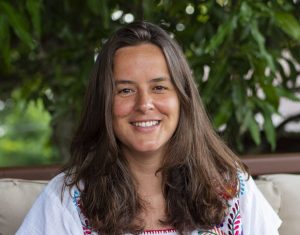When you hear the word shaman, you probably conjure images of primitive mystical healers or even modern tribal spiritualists that live deep in the jungles of South America, Australia, or Africa. While that isn’t wrong, the reality is that shamanism as a way of life is making its way into the West, and the people that practice it have created a path that balances modern scientific knowledge and technology with ancient wisdom and approaches to healing and self-fulfillment.
Bia Labate (Beatriz Caiuby Labate) is one such person. Born in São Paulo, Brazi in 1971, Labate went on to earn a bachelor’s degree in social science from the State University of Campinas (UNICAMP) in 1996 and obtained a master’s degree in social anthropology from the same university in 2000, receiving the Prize for Best Master’s Thesis from the National Association for Graduate Studies in Social Science (ANPOCS). Labate then went on to get her Ph.D. in Anthropology, which informs her interest in and study of psychoactive substances, drug policies, ritual and religion, and of course shamanism.
Using her vast knowledge about spiritual practices, shamanism, and entheogenic plants, Labate has edited numerous books and articles, including most recently, The Expanding World Ayahuasca Diaspora: Appropriation, Integration and Legislation as well as authoring several others, including the book A reinvenção do uso da ayahuasca nos centros urbanos.

Currently, Lablate is Visiting Professor at the Center for Research and Post Graduate Studies in Social Anthropology (CIESAS), in Guadalajara, Mexico as well as co-founder of the Interdisciplinary Group for Psychoactive Studies (NEIP) and editor of its site (www.neip.info). She is also a Research Associate at the Ayahuasca Defense Fund (ADF, http://ayahuascadefense.com) and a co-founder, with Alex K. Gearin, of kahpi (www.kahpi.info), an online ayahuasca learning hub, and chacruna (http://chacruna.net), a venue for publication of high-quality academic short texts on psychedelic plant medicines.
If that sounds like a lot, that’s because it is! Labate is simultaneously engaging and thorough in her quest to bring shamanism into a contemporary context. She is particularly passionate about the potential for ayahuasca to positively impact the thinking and direction of modern cultures, writing, often in direct opposition to prevailing orthodoxy. Unabashed, Labate writes, “ayahuasca neoshamanism represents a novel extension and reinvention of earlier types of neoshamanism with regard to an ethos of cultural opposition.”
Labate is also vocal about how shamanism is not a static force that remains fixed in time and place. Instead, she argues shamanism is socially co-constructed and mediated through cultural exchange, writing:
“Western perceptions of shamanism tend to seek the primordial shaman, emphasizing an essential connection with the past. This past, constructed as timeless, primordial, and mythical, represents shamanism as a stagnated cultural form. However, modern ethnographies show that shamanisms today must be understood in light of the interethnic context in which indigenous peoples are inserted. Shamanisms are situated historically and constitute dynamic systems of knowledge and practices that are negotiated and renegotiated in contexts where diverse cultural actors are in dialogue. (p. 98).”
Nor is Labate timid about how psychedelic substances are used, especially when they become commercialized. In particular, Labate believes clinical trials are not appropriate with regard to ancient psychedelic substances, such as ayahuasca, psilocybin mushrooms, and peyote. She argues, “Alcohol and tobacco did not have to go through [clinical trials]. Statistically-sound clinical trials were introduced in the 1940s to ensure the safety and efficacy of new drugs and treatments. This is, of course, not the case with psilocybin or ayahuasca. Epidemiology, or the collective human experience of consumers of these substances, simply trumps clinical trials.”
Although Labate’s social justice orientation may come across as strident in her polemics, she seems quite relatable and flexible in her thinking. One example of this is her experiences with American war veterans. Although Labate was raised in a counter-culture milieu, one that is inherently distrustful of military aggression and imperialism, Labate found herself accepting and loving of the vets she worked with using the transformative powers of ayahuasca. Here is how Labate describes the experience:
The two veterans were sweet and, yes, big men with muscles. One was a pilot and the other had been a soldier in Kuwait. They both had many other issues besides combat trauma. One had been sexually molested, and the other lost a great part of his family at early age, among other sad stories.
One of them cried and screamed the whole session. He rocked back and forth, like a child. He also whispered, and talked to himself. He made guttural and profound sounds for hours, which were kind of disturbing. These sounds seemed to come from another world.
After the first ceremony, he shared with me some war stories, his panic while in the field, having to shoot, and seeing ahead only women and children, smoke, fire, buildings falling down, chaos. He told my friend a vision that constantly haunted him: a frozen black burnt body with the arms outstretched, like a statue.
I felt so much sorrow in my heart, and tenderness for him. From the theoretical dilemmas I had constructed, and the Rambo-like figures I had conjured, he became a fellow human being to whom I could relate.
With Labate’s guidance, these men were eventually able to break down emotional barriers that had prevented full healing. This is testimony to not only the power of entheogenic medicines to bring about deep psychological and emotional change but to simultaneously ameliorate our entrenched beliefs systems, thus dissolving judgments and cynical assumptions about our fellow human beings. In a time when we are constantly attacking each other about our perceived differences, perhaps Labate’s approach and philosophy can serve as a balm to heal these psychic and cultural wounds so that we can work toward the grand union that has alluded us for eons.
At Newsweed.com, we adhere to three simple principles: truth, balance, and relatability. Our articles, podcasts, and videos strive to present content in an accurate, fair, yet compelling and timely manner. We avoid pushing personal or ideological agendas because our only agenda is creating quality content for our audience, whom we are here to serve. That is why our motto is ”Rolling with the times, straining for the truth.”
Your opinion matters. Please share your thoughts in our survey so that Newsweed can better serve you.
Charles Bukowski, the Los Angeles beat poet that captured the depravity of American urban life once said, “There is something about writing poetry that brings a man close to the cliff’s edge.” Newsweed is proud to stand in solidarity and offer you a chance to get close to the cliff’s edge with our first Power of Poetry Contest. Are you a budding bard, a versatile versifier, a rhyming regaler? Do you march to the beat of iambic pentameter, or flow like a river with free verse? If so, here’s your opportunity to put your mad poetic chops to the test. Enter our poetry contest for bragging rights and an opportunity to win some cash!






